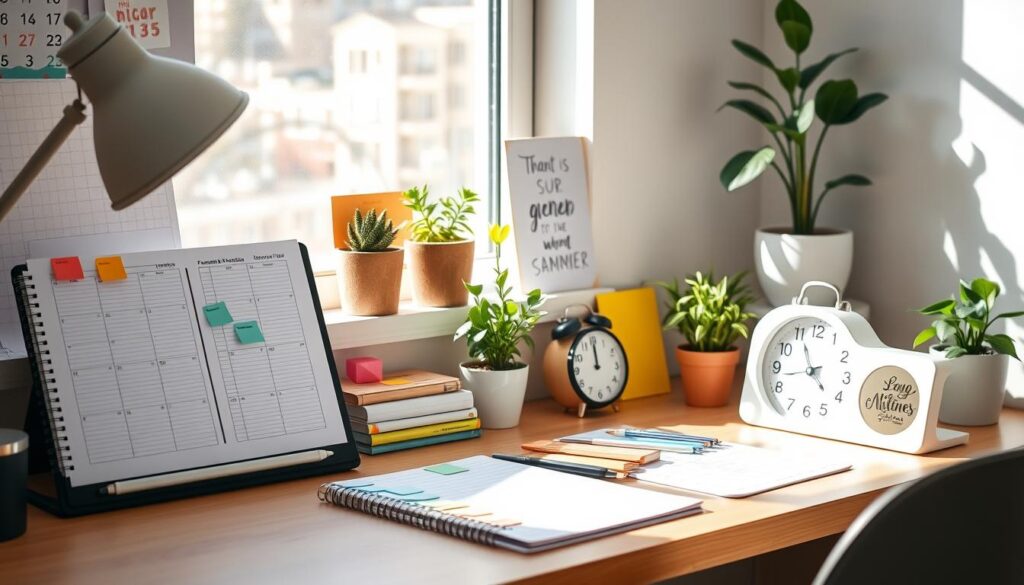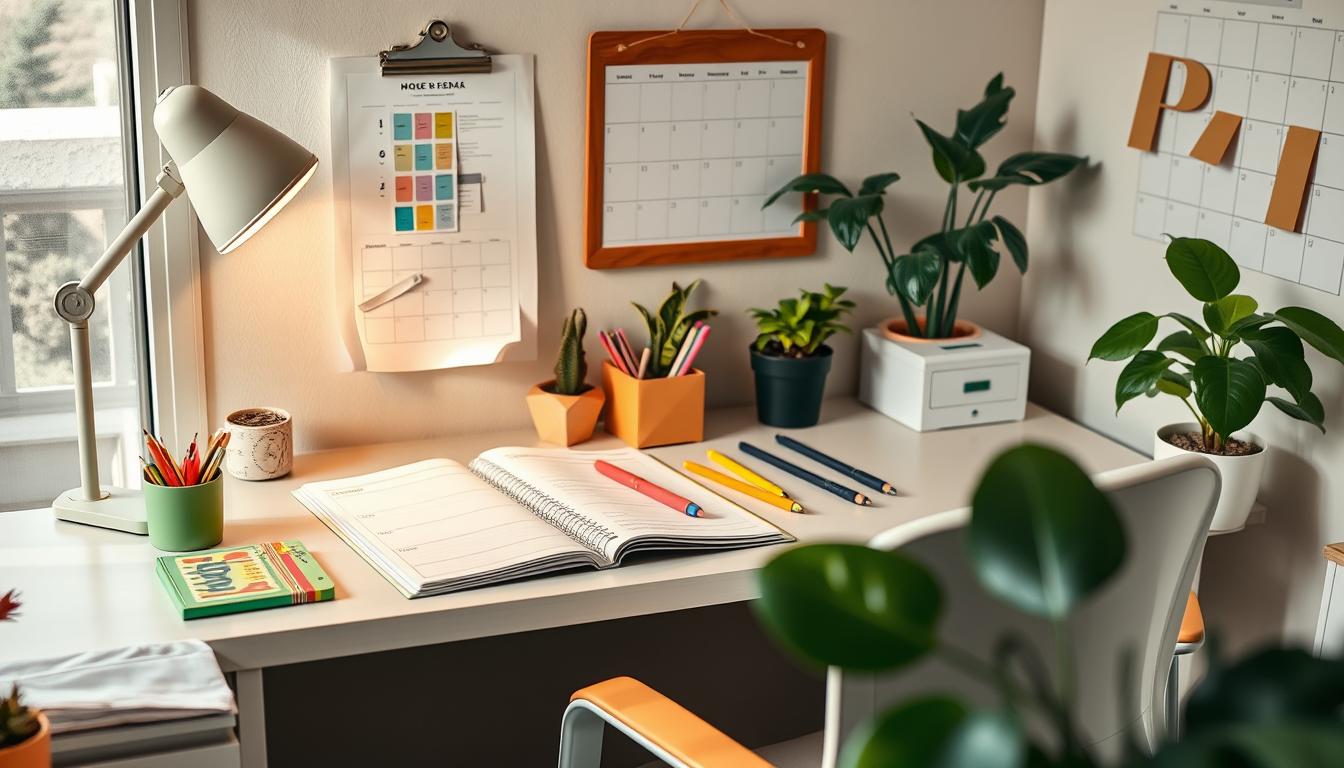Imagine a world where your days are filled with purpose. Your tasks are done efficiently, and your mind is clear. This is what an organized lifestyle offers. I’ve been there, struggling with chaos, and I know how life-changing it is to take control.
This guide will show you how to calm the chaos and find peace. Whether you want to improve your work, tidy up your home, or balance your personal life, we’ve got you covered. The tips and techniques here will help you achieve the organized life you dream of.
Table of Contents
Understanding the Foundations of Personal Organization
Personal organization is more than just cleaning up. It’s about managing your life in many areas. This includes work, home, digital life, social plans, mental health, fitness goals, and money matters. Knowing why you want to get organized can help you find good ways to do it.
The Psychology of Getting Organized
Getting organized helps reduce stress and mental clutter. When your space is messy, you might feel anxious or confused. Using personal organization methods can help you focus better and do things more efficiently.
Benefits of an Organized Lifestyle
Being organized can make you more productive and less stressed. It helps you manage your time and focus on what’s important. This can lead to success in your personal and work life.
Common Organization Challenges
But, getting organized isn’t always easy. You might struggle with procrastination, staying consistent, or dealing with digital mess. Knowing these challenges can help you find better ways to stay organized.
“The key is not to prioritize what’s on your schedule, but to schedule your priorities.” – Stephen R. Covey
Learning about personal organization can help you live a better life. It’s about finding the right balance and overcoming obstacles. This way, you can manage your time and work better.
Creating SMART Goals for Life Management
Setting effective goals is key to managing your life well. The SMART framework helps you make clear, achievable goals. Instead of saying “I want to be more organized,” say “I will declutter my closet by the end of the month.”
Break down big goals into smaller steps. Make a detailed plan and track your progress. This keeps you focused and motivated.
Studies show SMART goals work for health, business, and education. Setting “approach” goals, which are about actions you want to take, is more effective than “avoidance” goals.
| SMART Goal Example | Why it Works |
|---|---|
| I will save 15% of each paycheck, which is $200-$300, to reach a $3,000 savings goal by the end of the year. | This goal is Specific (amount and timeline), Measurable (tracking savings), Achievable (based on income), Relevant (building financial security), and Time-bound (year-end). |
| I will exercise for 20 minutes per day, three days a week, to improve my physical and mental well-being. | This goal is Specific (duration and frequency), Measurable (tracking exercise sessions), Achievable (realistic time commitment), Relevant (improving health), and Time-bound (ongoing). |
When setting SMART goals, break them down into smaller steps. Setting goals that are attainable, relevant, and time-bound boosts motivation and guides you to success.
The SMART goal-setting method is a great way to organize your life and reach your goals. By setting clear, measurable, and actionable goals, you stay focused and motivated to achieve your best.
Establishing Effective Daily Routines
Creating daily routines is key to being productive and managing time well. Successful routines are about doing the same things every day. They are consistent and help you stay on track.
A routine is about regular actions at specific times. But a schedule is about time slots. To make a good routine, it should be doable, timely, and fit your life.
Morning Routine Essentials
Begin your day with a morning checklist to boost productivity. Wake up at the same time, have a healthy breakfast, and set your daily goals. Make your morning routine personal and fit your best times.
Evening Routine Components
An evening routine can include planning for tomorrow. Lay out clothes, pack your bag, and check your calendar. This makes the next day easier and helps you relax before bed.
Divide tasks into morning and evening routines. This improves time management and keeps your day organized.
Weekend Planning Strategies
Use weekends to plan for the week ahead. Review your schedule, prep meals, and do household chores. This keeps you organized and ready for the week.
Having a daily routine makes you more productive and efficient. Tailor your routines to your life and needs. Always have some flexibility for surprises and update your routines as needed.
Organize Your Life: Essential Systems and Tools
Keeping your life organized can change everything. It needs the right tools and systems. Planners, productivity apps, and financial software are just a few solutions to help you manage your day and reach your goals.
The LifePlanner™ is a great tool for staying organized. It’s a calendar, checklist, and journal all in one. Digital tools like Asana also help with project management, reminders, and team work.
Setting up a family command center is another smart move. It keeps everyone’s schedules and important info in one place. Budgeting apps and spreadsheets also help you track your money and stay on budget.
Having a cleaning schedule can keep your home tidy without stress. Break down chores into smaller tasks and set specific times for them. This way, your home stays organized and clutter-free.
It’s all about finding the right tools for you. Try different organizational tools, productivity apps, and planners to see what works best. This will help you feel more in control and less stressed.
“Organizing your life is like building a puzzle – each tool and system is a piece that, when put together, creates a clear and cohesive picture of your priorities and responsibilities.”
Whether you like digital or analog, the right systems can make a big difference. Take time to find and use the tools that fit you best. Your life will become more organized, balanced, and meaningful.
Decluttering Strategies for Home and Work
Keeping your space tidy is key to a happy and productive life. Whether it’s your home or office, the right decluttering methods can make a big difference. Let’s look at some effective ways to organize your life and reduce stress.
Room-by-Room Organization Guide
Decluttering one room at a time is easier. Start with busy areas like the kitchen, bedroom, and living room. Give each item a home to make it easy to find and put back. Use shelves and cabinets to make the most of your space.
Digital Decluttering Methods
Our digital spaces can get messy too. Clean up your computer files and email inbox to stay focused. Use cloud storage, sort documents, and unsubscribe from unwanted emails.
Maintaining Clutter-Free Spaces
Keeping your space tidy is the hard part. Follow the “one in, one out” rule to avoid clutter. Regularly go through your belongings and give away what you don’t need. Use routines and checklists to keep your space organized.
By using these decluttering, home organization, and workspace organization tips, you can create a peaceful and productive area. It will support your well-being and help you reach your goals.
| Decluttering Tip | Description |
|---|---|
| 10-12-12 Challenge | Identify 10 items to throw away, 12 to donate, and 12 to return to their proper home. |
| Four-Box Method | Sort items into four categories: keep, donate, recycle, and trash. |
| 20/20 Rule | Discard items replaceable for under $20 and within 20 minutes. |
| Five-Second Rule | Decide to discard an item if its usage memory retrieval exceeds five seconds. |
| Rule of Five | Remove items not used in the last five years. |
Time Management and Productivity Techniques
Effective time management is key to staying organized and reaching your goals. Use time blocking to protect yourself from distractions and focus on important tasks. Track your time to spot and cut out habits that waste it. Learn to delegate tasks to have more time for what matters.
Don’t fall into the trap of multitasking, as it can hurt your focus and efficiency. Instead, tackle one task at a time for better results. Use tools like Todoist or Google Calendar to manage your time better and keep your priorities straight.
- Try the Pomodoro technique: Work in 25-minute bursts, then take a 5-minute break to boost concentration and avoid burnout.
- Use the Eisenhower Matrix to sort tasks: Focus on urgent and important ones, delegate urgent ones, and eliminate the rest.
- Use productivity apps: Tools like Forest, StayFocused, and Freedom can block distractions and help you stay focused.
Setting SMART (Specific, Measurable, Achievable, Relevant, and Time-bound) goals is vital for good time management. Do a time audit to see how you spend your time and make smart choices about what to prioritize.
| Technique | Description | Benefits |
|---|---|---|
| Time Blocking | Set specific times for tasks and activities | Less distraction, better focus, and more productivity |
| Eisenhower Matrix | Sort tasks by urgency and importance | Helps prioritize and make better time choices |
| Pomodoro Technique | Work in 25-minute chunks, then take a 5-minute break | Improves focus, reduces fatigue, and boosts productivity |
Time management is a skill you can improve over time. By using these techniques daily, you can manage your time better, increase your productivity, and reach your goals with more focus and efficiency.

“Time management is not about getting more things done in a day, it’s about getting the right things done.” – Zim Flores
Building Healthy Habits and Self-Care Practices
Self-care and healthy habits are key to a balanced life. Adding self-care to your daily routine boosts your physical and mental health. This leads to better productivity, resilience, and happiness.
Physical Wellness Routines
Start a regular exercise plan that fits your style and goals. Activities like yoga or cardio improve your energy and sleep. Eat a balanced diet to fuel your body.
Mental Health Organization
It’s vital to care for your mental health as much as your physical health. Try meditation or journaling to manage stress. A mental health plan helps you handle emotions and stay balanced.
Work-Life Balance Strategies
Keeping work and personal life separate prevents burnout. Set boundaries and make time for hobbies and friends. Use time blocking and digital detoxes to ensure self-care.
| Self-Care Practices | Benefits |
|---|---|
| Regular exercise | Improved physical health, increased energy, better sleep |
| Mindfulness and meditation | Reduced stress and anxiety, enhanced emotional regulation |
| Maintaining work-life balance | Prevented burnout, increased productivity, improved mental health |
Adding self-care and work-life balance to your routine greatly improves your life. These practices help you live a more fulfilling and balanced life.
“Self-care is not selfish. You cannot serve from an empty vessel.” – Eleanor Brownn
Financial Organization and Planning
Organizing your finances is key to reaching your financial goals. Whether you want to pay off debt, save for the future, or control your spending, a good plan helps a lot.
Begin by setting financial goals that are clear, measurable, and achievable. These goals should be relevant and have a deadline. Check your progress often and adjust your goals to stay on track.
Use financial management tools and apps to manage your money. They help track spending, create budgets, and automate payments. This saves time and avoids late fees.
Keep your financial documents, like tax returns and bank statements, safe and easy to find. This makes it simpler to access them when needed and prepares you for financial checks.
Check your accounts regularly for any issues. Look for unauthorized charges, monitor your credit report, and ensure your investments are doing well. For complex planning, like retirement, consider a financial advisor.
“A well-organized financial life can lead to greater peace of mind and a stronger foundation for achieving your long-term goals.” – [Financial Expert]
By following these steps, you’ll be on the path to better financial management, budgeting, and financial goals. Remember, improving your finances is a journey, but the benefits are worth it.

Conclusion
Organizing your life is a journey that never ends. It takes a commitment to always get better. By doing this, you can enjoy more productivity, less stress, and better well-being. The aim is not to be perfect but to find what works for you.
Begin by setting SMART goals for personal and work growth. Use time management tools like the Eisenhower Matrix and the Pomodoro method. Also, use apps to manage your tasks and work more efficiently. Keep updating your methods as your life changes to stay effective.
Living an organized life clears your mind, lowers stress, and boosts your productivity and success. Start this journey and you’ll find a more fulfilling life. Remember, even small steps can make a big difference. So, begin where you are and keep improving over time.
FAQ
What is the importance of organizing your life?
Organizing your life helps you manage your time and priorities better. This leads to more productivity, less stress, and better mental health.
What are the key areas of personal organization?
Key areas include managing work, home, digital life, social calendar, mental well-being, fitness goals, and finances.
What is the psychology behind personal organization?
Personal organization reduces stress and cognitive overload. It leads to better decision-making and overall well-being.
What are the benefits of an organized lifestyle?
An organized lifestyle boosts productivity, reduces stress, and improves mental health.
What are the common challenges in personal organization?
Common challenges include procrastination, maintaining consistency, and dealing with digital clutter.
How can SMART goal-setting help in organizing life?
SMART goal-setting helps you stay focused and motivated. It makes working towards your goals easier.
What are the essential components of daily routines?
Daily routines include morning and evening routines, and weekend planning. They boost productivity and tackle tasks efficiently.
What tools and systems can help in organizing your life?
Tools and systems include planners, calendars, productivity apps, and financial management tools. A family command center is also helpful.
How can decluttering help in maintaining an organized life?
Decluttering physical and digital spaces leads to a clutter-free environment. It clears your mind and reduces stress.
What time management techniques can boost productivity?
Time management techniques include time blocking, tracking your time, delegating tasks, and avoiding multitasking. They improve focus and efficiency.
How can self-care and wellness practices support an organized lifestyle?
Self-care and wellness practices, like regular exercise and healthy eating, contribute to overall well-being. They support an organized lifestyle.
How can financial organization and planning help in managing your life?
Organizing your finances through goal-setting, budgeting, and automating payments leads to financial stability. It supports your overall life management.


9 thoughts on “How to Organize Your Life: A Simple Guide to Success”